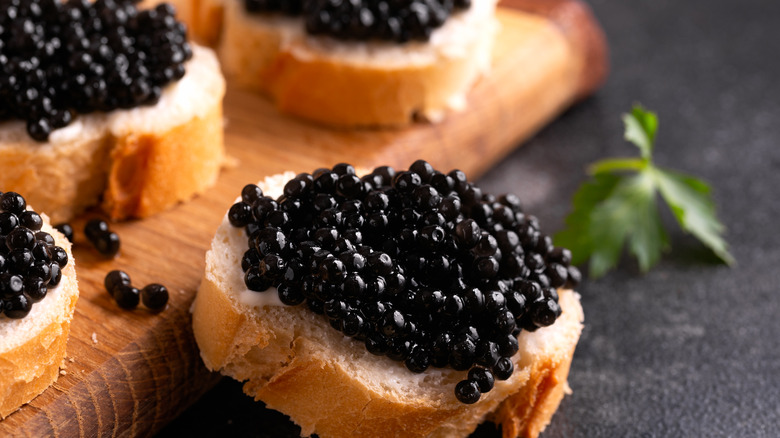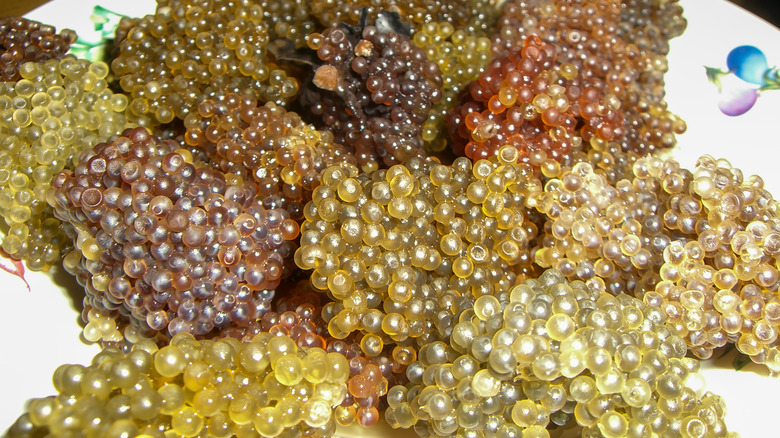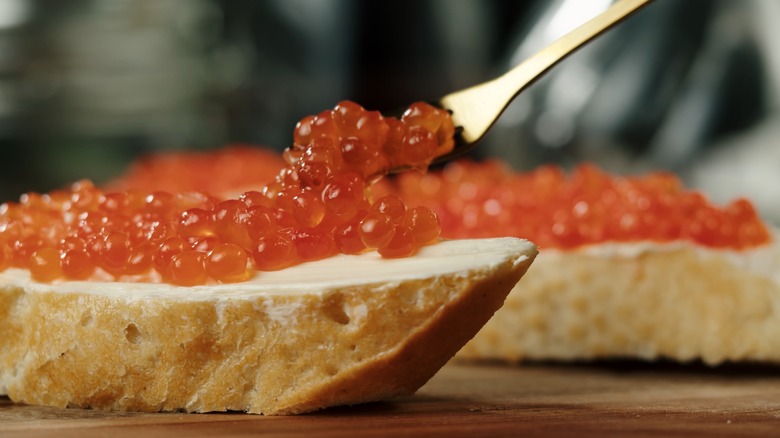What, Exactly, Is Vegan Caviar?
We may receive a commission on purchases made from links.
While caviar has long been a symbol of luxury and class, the reality is that the flavor and texture of fish eggs are very polarizing for those who get the opportunity to taste them. Some people find that fish eggs resemble the unpleasant flavor of the ocean while others love the salty, fishy taste. The texture is also important when consuming fish eggs since you're not supposed to chew caviar but have it melt in your mouth, allowing its buttery flavor to release slowly.
Of course, those who follow a vegan diet don't eat any animal products and wouldn't be able to try real caviar. However, the goal with vegan alternatives to animal-based foods is to replicate the taste and texture of the original. While there are many vegan seafood options that you shouldn't buy, caviar doesn't seem to be one of them.
Vegan caviar can be done in a variety of ways; one popular method is using seaweed or kelp. Since these sea vegetables are types of marine-based algae, they already contain many similar flavor notes to caviar like the salt water and brinyness.
You can make vegan fish eggs in many ways
Cavi-art, a specific plant-based caviar brand, describes their process of turning seaweed into caviar-shaped pearls by mixing water and spices with the seaweed that's been dried into a powder. However, the Amazon reviews of the product are mixed with some claiming the texture resembled "rubber balls," and is "way off" while others thought it was "nicely textured with a hint of the sea" from the seaweed.
Alternatively, Tonburi, or "land caviar" is sourced from the seeds of the summer cypress tree. It can taste like broccoli on its own and resemble caviar's texture and "pop" once boiled, soaked, and hulled. Plus, you can season Tonburi with soy sauce, sesame oil, or nori for that ocean flavor.
While there have been many advancements in plant-based alternatives, vegan caviar can also be made at home with ingredients in your kitchen. One Reddit user shared a recipe for vegan caviar using chia seeds, soy sauce, ground nori sheets, and lemon juice. The Redditor noted the delicious flavor and described it as salty with a "hint of ocean [and] a hint of lemon." Another vegan alternative mentioned by Redditers was a "southern caviar" made from pickled mustard seeds. It was also noted that agar agar, a plant-based gelatin, is used in more mainstream vegan caviar products.
Vegan caviar will likely be more affordable
Of course, it's going to be difficult to replicate real caviar perfectly. Even if you're not vegan, the lower price point is quite appealing to consumers. One of the reasons caviar is so pricey is due to the strenuous process of retrieving this delicacy. The traditional harvesting method kills the fish but a more humane alternative can be done to retrieve the eggs via c-section. Understandably, most vegans find both options unacceptable.
While regular caviar is known for being extremely expensive, the price range often depends on the variety of fish, the quality of the product's flavor, and the scarcity of its production. According to Sterling Caviar, top-notch caviar from the Beluga sturgeon or Osetra caviar, which was long favored by the royals, can set you back hundreds or thousands of dollars for a single ounce. Alternatively, lower quality caviar like the Lumpfish variety can be found at a much cheaper price point, similar to the plant-based caviar made from kelp that often sells for less than $10 an ounce.
Luckily, when it comes to vegan caviar, the price point is much more attainable for even the highest quality. Beyond pricing, vegan caviar has found favor amongst pregnant people who are often advised to avoid raw fish. So, although it's not identical, vegan caviar can be a great alternative for those craving the real deal.


